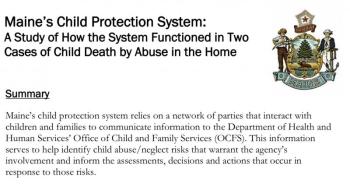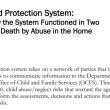State investigators release initial report concerning abuse deaths of two Maine children
AUGUSTA — The first phase of the official investigation into the deaths of two Maine children at the hands of their caretakers has concluded, with the official report released to the public May 24, the same day they were presented.
On March 9 the Government Oversight Committee (GOC) directed the Office of Program Evaluation and Government Accountability (OPEGA) to determine the facts surrounding the deaths of four-year-old Kendall Chick, allegedly killed by her grandfather’s then-fiance, Shawna Gatto, in Wiscasset, and 10-year-old Marissa Kennedy, who died violently at the hands of her mother and stepfather.
Gatto was arrested and charged with depraved indifference murder following the little girl’s December death. Marissa’s mother and stepfather, Sharon Carrillo, 33, and Julio Carrillo, 51, were arrested Feb. 26, the day after the young girl succumbed to injuries sustained over months of daily abuse. They were both also charged with depraved indifference murder and have been held in Two Bridges Regional Jail in Wiscasset since their arrest.
There has been anger and accusations leveled against the Department of Health and Human Services (DHHS), particularly in the case of Marissa Kennedy. DHHS had reportedly been made aware of suspicions of abuse from several agencies, yet failed to take action to protect the girl, it has been reported.
The OPEGA investigation is occurring in two phases, with the first being a fact-finding phase where investigators “determined the facts surrounding the handling and response to potential child abuse and neglect reports received by DHHS in the cases of Marissa Kennedy and Kendall Chick,” according to OPEGA.
While confidentiality laws prevent OPEGA from reporting detailed information on Marissa and Kendall, they offered a “high-level summary of their observations from the two cases, the role of DHHS and mandated reporters in protecting children, and potential areas for concern or improvement.”
The report notes that the two cases exist on opposite ends of the spectrum “in terms of interactions with mandated reporters and other individuals that had opportunities to observe what was going on in their young lives.”
The specific areas where DHHS stands to improve are also different between the two children, according to the report.
Though the report does not specify which child is which with regard to DHHS involvement, it is known that concerns about Marissa Kennedy were reported multiple times to the agency.
Despite the differences, the two children also share multiple grim realities.
“Both children died from physical abuse believed to be occurring over some period of time in the two-adult home where they resided,” the report said.
Both also had physical marks observed by others outside the households explained by caretakers as injuries the children had caused themselves, an explanation the report notes seemed reasonable to those concerned.
Records were sought from a number of agencies for investigator review, including DHHS, Maine State Police, relevant municipal and county law enforcement, relevant school districts and the Department of Education inclusive of Child Development Services.
OPEGA wrote that their overall findings include: “that the [Office of Child and Family Services] failed to follow policies and procedures in fully assessing the appropriateness of the placement and staying engaged with the child and family to ensure needed services and supports were provided. Poor job performance and inadequate supervision appear to have been factors.”
Investigators also wrote that the risk of child abuse/neglect, particularly in terms of risk of physical abuse, was not “necessarily evident” without continually putting together pieces of information held by various parties interacting with the child/family over time. Though information was shared between agencies, the report notes that was mostly due to “certain mandated reporters.”
While there were reportedly several junctures, particularly in the last two months of Marissa’s life, where greater information sharing might have prompted further assessment of the family risk level, there is no guarantee that further actions of different approaches would definitely have been taken.
The report also noted that OPEGA investigators observed that overall “there was no lack of individuals from various entities persistently trying to assist the family and make a difference in their lives.”
Investigators also wrote they believe they have: “gleaned a decent understanding of what occurred, and what did not, with regard to roles various entities played in these children’s cases. We are, however, lacking full understanding of the context of the various perspectives, particularly around what factors impacted their decisions and actions. Additionally, we have not yet completed assessing whether the responses, decisions and actions of OCFS or any other entity were consistent with statute and rules, and the policies, procedures and training specific to those entities.”
With this in mind, OPEGA investigators say they are unable to say yet, at least with any certainty, whether potential areas for concern or improvements they have noted might have changed the outcomes for these children. “In reality, we may never know that for sure,” the report states.
Despite this, investigators have identified potential areas of concern or improvement in the child protective system that seem worth exploring further toward the goal of better protecting children in the future.
The second phase of the investigation will consist of looking further into potential areas of concern and improvement.
There are 11 bullet points for potential areas of concern or improvement to consider included in the report.
Some of these include guidance and training for mandated reporters, including expectations for what constitutes “reason for suspicion,” timeliness of answering phone calls regarding potential abuse and neglect by OCFS intake workers, and appropriateness of caseloads and adequacy of supervision and training for OCFS and Alternative Response Program staff.
The last thing noted in the report is that: “there were also many individuals who contacted OPEGA wanting to share their concerns regarding the child protective system. [OPEGA] did not have time to gather information from them all, but we are prepared to share the perspectives we did get when working with the GOC on areas of focus for the broader child protection system review.”
A public hearing about the official results of OPEGA’s phase one investigation will be held in the Maine State Legislature next week where OPEGA investigators and other relevant parties will be on hand to testify before an open court.
Related stories:
Mother, stepfather arrested following 10-year-old daughter's death in Stockton Springs
Mother, stepfather accused of murdering daughter to make first court appearance Wednesday
Bail set at $500k for mother, stepfather accused of murdering daughter
Sen. Thibodeau calls on Governor for investigation into DHHS following girl's murder
Searsport schools plan 'Dress Blue' day in remembrance of slain girl
Sen. Thibodeau issues statement following LePage remarks on murdered 10-year-old
Update: State investigation into Marissa Kennedy's death to take place in two phases
Sharon, Julio Carrillo indicted for murder of 10-year-old Marissa Kennedy
Attorney for Sharon Carrillo seeks bail reduction, cites spousal abuse
Maine Children's Trust donations grow following Stockton Spring girl's death
Sharon Carrillo lawyer accuses state of deception
Carrillos plead not guilty to charges of murdering 10-year-old
Carrillo prosecutors to remain on case, judge decides
Maine Supreme Court to decide whether Sharon Carrillo prosecutors stay on case
Erica Thoms can be reached at news@penbaypilot.com
Event Date
Address
United States
























